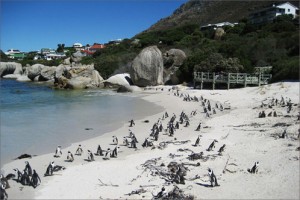 Summer has begun in the Mother City, which means that Cape Town beaches are starting to become the most popular place to be on hot days!
Summer has begun in the Mother City, which means that Cape Town beaches are starting to become the most popular place to be on hot days!
From the colder Atlantic Ocean beaches of Clifton, Camps Bay and Hout Bay, to the warmer False Bay beaches of Muizenberg, Fish Hoek and Boulders, every beach has its own unique highlights, marine life and views. There are also specific laws and other things to note when enjoying these diverse beaches. Don’t worry – that doesn’t mean you can’t look forward to hours of fun in the sun. These laws are put in place to make sure that the beaches remain as pristine and beautiful as possible, while also protecting the greater marine environment.
In addition to regulations that may be in place, we also want to share some useful tips and info that will help you enjoy your time on our amazing beaches. Read, enjoy and then go over to our Cape Town beach guide to see which beaches make our list of favourites!
Cape Town Beaches – Guidelines and Regulations
Depending on the coastline and various other factors, some beaches have special regulations in place. For the most part, littering, excessive noise, vandalism and other no-no’s are standard across all beaches (as they are all over the world of course). Some other beach regulations that may apply include:
- False Bay Beaches – this side of the coast is famous for its shark sightings, and there is an organisation especially set up to warn the public of these sightings. Shark Spotters monitors shark activity from a look-out point, with flags placed across beaches on the False Bay side to let you know what the status is on any given day. Green flag = good visibility, no sharks. Black flag = low visibility, no sharks. Red flag = shark spotted but not visible. White flag = shark spotted, bathers should leave the water immediately.
- Atlantic Ocean Beaches – there are no shark warnings or risk on this side of the coast, and swimming can be enjoyed. The water can be on the chilly side however, so be prepared for a very refreshing dip. A recent law has been passed that prohibits local traders from selling cold drinks and ice creams on the beach; however vendors will be set up at designated points instead.
- Tides and Currents – high tide and low tide depends on the phase of the moon, and for the most part, the majority of beaches in the Cape Town area are safe for swimming. With that said, currents and sandbanks can create minor risks if swimming further out to sea. Stay closer to the beach, and don’t spend too long out at greater depths to avoid fatigue.
- Marine Life – beaches such as Boulders are known for their penguins, which are very cute but also protected. Both False Bay and Atlantic Ocean sides also sometimes have Cape fur seals in the water. They are not dangerous, but should still be treated with respect. Our marine life is precious, and we want to be able to share the oceans. Do not attempt to touch any marine species you may encounter – rather enjoy the experience without interfering.
- Sun Protection – in the southern hemisphere, and especially in South Africa, the sun beats down strongly. Sunscreen is essential even on overcast days, and should be reapplied if you have been for a swim. The sun is at its hottest at the midday peak, and spending too much time outdoors in this time could result in sunburn or too much exposure. A hat, sunglasses and plenty of water are also recommended.
Beach sports such as volleyball and Frisbee can be enjoyed on all beaches across Cape Town, and dogs are permitted on many beaches too. The aim of these guidelines is to make the beaches a great place for all – locals, visitors and the environment too.
What is your favourite Cape Town beach and why? Share your thoughts below and tell us where you plan to spend your summer days!





